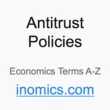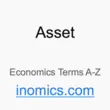-
- Economics Term
- Posted 1 year ago
AD-AS Model

-
- Economics Terms A-Z
- Posted 6 years ago
La selezione avversa
en it es de fr
-
- Economics Terms A-Z
- Posted 2 years ago
Aggregate Demand
en de
-
- Economics Terms A-Z
- Posted 2 years ago
Aggregate Supply
en de fr
-
- Economics Terms A-Z
- Posted 6 years ago
Le politiche antitrust
en it es de fr
-
- Economics Terms A-Z
- Posted 6 years ago
Gli asset o attività
en it es de fr
-
- Economics Terms A-Z
- Posted 6 years ago
L’asimmetria informativa
en it es de fr
-
- Economics Terms A-Z
- Posted 3 years ago
Autarky
en es de











